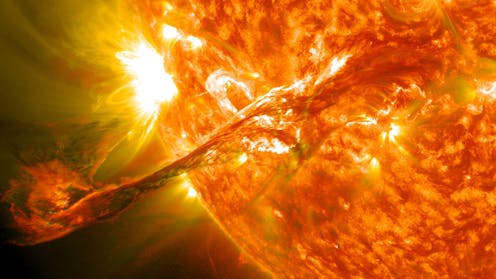
Environment + Energy – Articles, Analysis, Comment
Displaying 151 - 175 of 1210 articles

Exploring the often unseen, and poorly understood, nuances of diversity within coral reefs may prove essential for ensuring the long-term health of Earth’s oceans.

New research sheds light on the interconnected nature of the human genome and what this means for future gene therapies.

Social media has been vital for disseminating information during crises, but with Facebook’s ban of news in Canada, old-school media, especially radio, is critically important.

Wes Anderson’s film ‘Asteroid City’ encompasses an environmental grief that manifests as failure to accept an uncontrollable reality.

Governments and corporations must work together to transform environmental, social and governance policies.

The devastating wildfire that destroyed the historic Maui town of Lahaina was still making headlines when Yellowknife issued an evacuation order.

An unprecedented win for climate justice in Montana has the potential to send reverberations around the world, including here in Canada.

As the mass evacuation of Yellowknife unfolds, the needs of minority populations will emerge. Past experiences indicate emergency officials may not be ready to meet the needs of a diverse population.

Ontario’s Doug Ford government engages in a casual approach to decision-making that regards normal governance processes as nothing but delay-inducing red tape.

Boreal plants produce molecules that are valued by traditional medicines and inspire the development of medicinal products by contemporary chemists.

Dealing with climate change requires us to address not just our carbon emissions but also the disconnection with ourselves and our planet which fuels ecological destruction.

Humans (particularly those in the Northern Hemisphere) generally prefer the heat, a bias which has hampered effective climate communications for decades.

We’re currently a few years into the 25th studied solar cycle. An 11-year period of sun activity, this solar cycle is more active than previously expected.

We need to pay close attention to the potential impacts that high levels of microplastics might have on environments and find ways to reduce microplastic levels in Canada’s wastewater stream.

Recent survey evidence suggests that most Canadians have positive opinions of wolves and rural Canadians in particular have strongly positive feelings on wolves and their protection.

Language is adaptive, self-balancing and evolves with environmental change. Understanding this may be the key to developing more nuanced climate change discourse.

Some boreal plant species are classified — and treated — as weeds, affecting Indigenous communities’ access to important cultural, medicinal and ceremonial resources.

Involving youth in promoting health in schools can catalyze students’ ability to bring about positive change. On International Youth Day and year round, more adults could lift up youth voices.

The power of storytelling to help inform our decisions is underappreciated and of vital importance in envisioning a better future, and the steps to take to get us there.

As extreme weather events increase in frequency and severity, many Canadians are still unaware of how to prepare for a natural disaster.

Many heat-related health problems can be avoided by adopting a healthy, active lifestyle. But the younger generation is less active than previous generations, and therefore more vulnerable.

The important role living roots play for sustaining life belowground should prompt us to rethink forest management.

Recent headlines around the supposed impending collapse of the Atlantic currents remind us of the importance of avoiding sensationalism in facing global warming.

Climate anxiety is real and must be considered as a core component of any climate mitigation or adaptation and resilience strategy.

As the drive towards electrification advances, one fact seems clear: it is far easier to reuse waste heat for our homes and businesses than it is to generate it anew.
